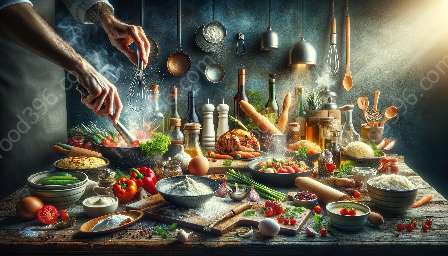Food preparation techniques play a crucial role in creating delicious and visually appealing dishes. Whether you're an amateur cook or a seasoned chef, mastering these skills can take your culinary creations to the next level. From knife skills to cooking methods, understanding the fundamentals of food preparation is essential for anyone passionate about cooking and recipes.
Knife Skills
Knife skills are the foundation of food preparation. The ability to chop, slice, and mince ingredients properly not only affects the appearance of the final dish but also influences the flavors and textures. The following techniques can help you master the art of using a chef's knife:
- Julienne: Cutting ingredients into thin, matchstick-shaped pieces.
- Dice: Creating evenly-sized cubes of ingredients.
- Chiffonade: Rolling and cutting leafy herbs or greens into thin ribbons.
Developing precision and speed in these knife skills will streamline your cooking process and elevate the presentation of your meals.
Cooking Methods
Understanding various cooking methods empowers you to manipulate ingredients in unique ways, unlocking their full potential. Some popular cooking techniques include:
- Grilling: Infusing ingredients with smoky flavors while retaining their natural juices.
- Braising: Slowly cooking ingredients in a flavorful liquid to tenderize and enhance their taste.
- Sautéing: Quick, high-heat cooking to add caramelization and depth of flavor.
Experimenting with different cooking methods allows you to uncover new dimensions of flavor and texture in your dishes.
Seasoning and Flavoring
Seasoning and flavoring techniques are essential for creating well-balanced and delicious recipes. Understanding how to layer flavors and use herbs, spices, and aromatics effectively can transform a simple dish into a culinary masterpiece:
- Using fresh herbs to add brightness and depth to dishes.
- Blooming spices in oil or dry to enhance their aroma and flavor.
- Layering seasonings throughout the cooking process to build complexity.
Mastering the art of seasoning and flavoring is pivotal in creating memorable dining experiences for yourself and others.
Culinary Arts and Creativity
Culinary arts involve the meticulous preparation of ingredients, combined with creativity and innovation. The fusion of different flavors, textures, and colors can result in breathtaking culinary creations:
- Experimenting with unusual ingredient combinations to create surprising flavor profiles.
- Using food presentation techniques to enhance visual appeal and elevate the overall dining experience.
- Exploring global cuisines and incorporating diverse culinary traditions into your cooking.
Embracing culinary arts and creativity allows you to push the boundaries of traditional recipes and create unique dining experiences.
Food Safety and Hygiene
Practicing proper food safety and hygiene is fundamental to food preparation. These techniques ensure that your meals are not only delicious but also safe to consume:
- Proper handwashing and sanitation to prevent cross-contamination.
- Safe food storage and handling to maintain ingredient freshness and prevent spoilage.
- Understanding cooking temperatures and using cooking thermometers to ensure proper doneness.
By prioritizing food safety and hygiene, you can confidently share your culinary creations with friends and family.

